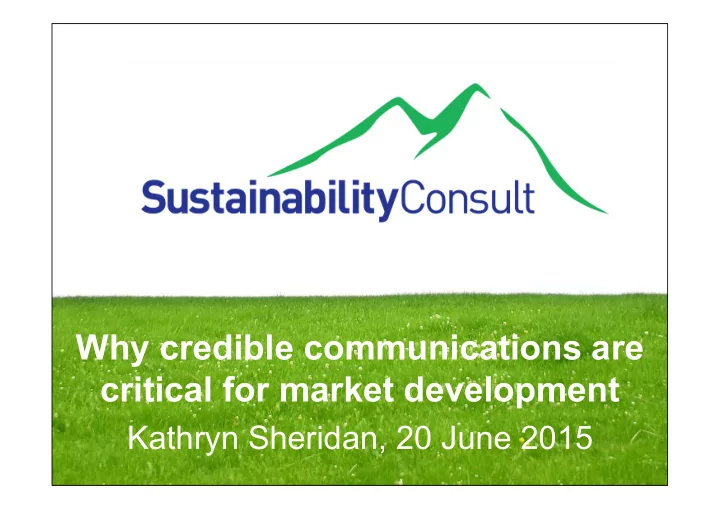

Why credible communications are critical for market development Kathryn Sheridan, 20 June 2015
Bioeconomy Advocate
Sustainability Consult
More Than PR • Business Development • EU policy and sustainability communications • Marketing communications • Media relations/PR • Stakeholder Engagement
Sustainability Communications • We ask the tough questions
Our Reach In Bio • Platform chemicals – succinic acid, levulinic acid, 5-HMF • Wood-based chemicals/sugars – xylose etc • Glycerine-based chemicals – epichlorohydrin • Bioplastics • Advanced biofuels • Enzymes • Certification schemes • Venture capital firms
What I’ve Learned
Balancing Act • All visibility and no credibility = greenwashing • All credibility and no visibility = commercial death • Visibility and Credibility
Perception Is Reality • Chemical industry has a perception problem • Limited awareness • Poor science education • Issues-driven • Easy target for NGOs
Additional Complexity • GMO – feedstock and organisms • Public fear/lack of understanding around ‘chemicals’ and ‘plastics’ • ‘Everything is toxic’ mentality • Emerging sector so societal acceptance
Making Headlines • Industry in general has trust issues
Who Do We Trust? • Trust business leaders to: • Solve social or societal issues 19% • Correct issues 26% • Make ethical and moral decisions 21% • Tell the truth 20% Edelman Trust Barometer 2014
Trust Void • Edelman Trust Barometer 2014 • Government 44% (15% trust a great deal) • Media 52% (16%) • Business 58% (16%) • NGOs 64% (23%) • “CEO must become Chief Engagement Officer”, says Edelman
Rebuilding Trust • Visibility and Credibility • = Trust • = Societal Acceptance • = Market Demand • = Sales
Similarities To Biofuels • Use of natural resources – biomass, land, water etc • Emerging technology so societal acceptance challenge • Lack of science education
Market Demand 1. To (re)build confidence in chemicals, we need to tell the story 1. We need to engage in a transparent, credible conversation
Stakeholders • Consumers • Regulators • Media • Brands • NGOs • Value chain • R&D
Stakeholder Engagement • “Isn’t it the regulators’ job?” • “The trade association does it” • “We prefer to keep a low profile (Exxon style) than engage (Shell style)” • “If I engage, I just get attacked”
Warning Signs • My alarm bells are ringing • Targeted NGO attacks on ‘the good guys’ • Bio is on the NGO radar
Ecover/Solazyme
Synbio (from ETC) • “Synthetic biology is a new area of extreme genetic engineering ” • “A new and unregulated set of genetic engineering techniques”
Ice Cream
No Synbio nosynbio.org
Culture Of Fear • Synthetic biology – synbio • GMO – Franken foods • Non-natural • Toxics
Widespread Implications • Reputation damage to brand owners (Ecover, Haagen Dazs) more significant than to suppliers (Solazyme, Evolva) • NGOs are paying attention to biomaterials • Reputational issue but also financial • Crisis communications is much more costly than getting it right first time. Think BP!
Five Commandments Brochure
Five Commandments For A Healthy Bioeconomy
Commandment 1 • We need to consume less and consume better
Commandment 2 • Just because it’s ‘bio’ doesn’t mean it’s sustainable
Commandment 3 • Back up sustainability claims with data
Commandment 4 • Work out where the ‘waste’ is coming from
Commandment 5 • Be transparent on GMO
Your Take-Away • If the consumer learns about your sector from NGOs…
Your Take-Away • If the consumer learns about your sector from NGOs… • It’s game over.
Communications Audit
Our Community
Thank You • Kathryn Sheridan • CEO, Sustainability Consult • Credibility Audits available • @kathrynsheridan • ks@sustainabilityconsult.com
Recommend
More recommend